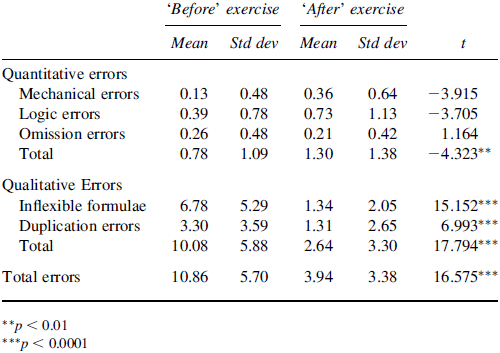Authors
Ian Beaman, Erwin Waldmann, & Peter Krueger
Abstract
Spreadsheet models are used extensively in business as an important aid in decision support particularly in areas like financial analysis, budgeting and forecasting. If these models were compromised through quantitative and qualitative errors, the resulting decision making would be based on fallacious information with potentially disastrous outcomes.
Consequently, it is imperative that accounting professionals receive adequate training in spreadsheet modelling, especially as past research has shown that these types of errors are common.
This paper reports on a survey and spreadsheet exercise given to a group of second-year undergraduate accounting students at an Australian university, both before and after a semester course aimed specifically at teaching spreadsheet design principles and problem-solving techniques.
The findings show that spreadsheet errors and, in particular, spreadsheet design errors are prolific even for a simple domain-free exercise. Results also show that the incidence of these errors (and again, particularly design errors) was reduced significantly after a semester of teaching spreadsheet design principles.
The results support the contention that accounting educators should include a course in spreadsheet design principles and problem-solving techniques as part of an undergraduate accounting program.
Sample

Paired sample t-tests were performed on the 'before' and 'after' results to determine the impact of the training the students received in the 'Financial Modelling' course on both 'Quantitative' and 'Qualitative' errors.
The total number of 'qualitative' errors dropped significantly from 10.08 per student to 2.64.
Unfortunately, the same was not true of 'quantitative' errors, which increased from a mean of 0.78 per student to 1.30.
Overall, however, the total number of errors (both quantitative and qualitative) reduced very significantly from a mean of 10.86 per student to 3.94.
Publication
2005, Accounting Education: An International Journal, Volume 14, Number 2, June, pages 199-212
Full article
The impact of training in financial modelling principles on the incidence of spreadsheet errors
